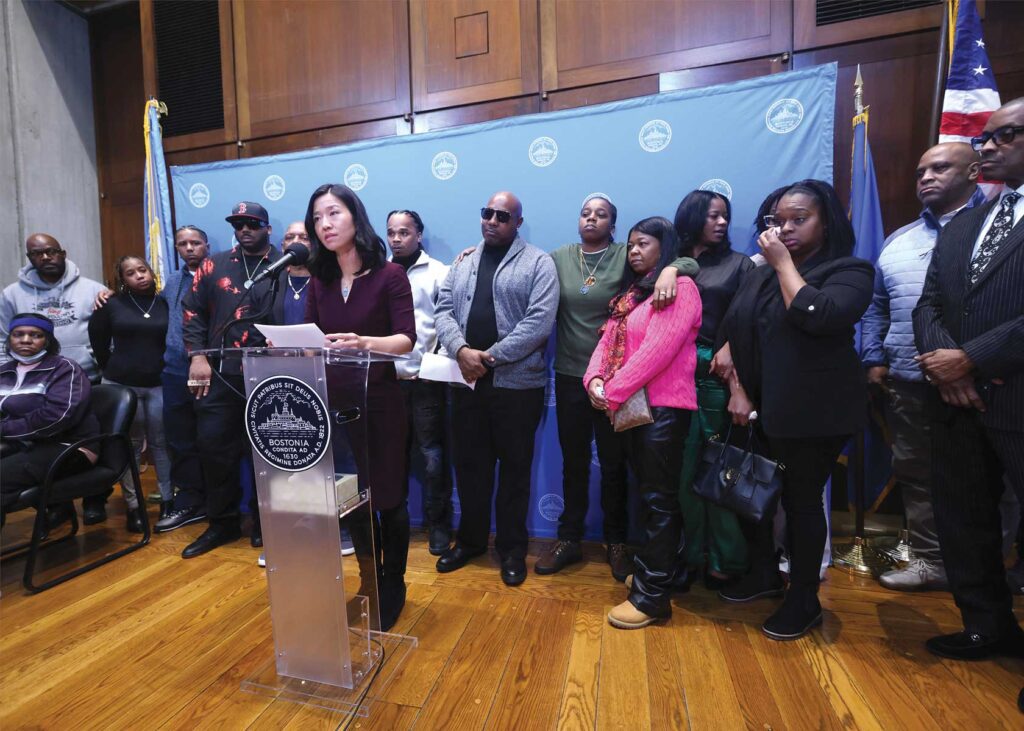City’s apology to Bennett, Swanson families long overdue, leaders say
A first step to healing, 34 years after Charles Stuart case

Members of Boston’s Black community saw the city’s formal apology to two Black men wrongly linked to the 1989 murder of Carol DiMaiti Stuart as just one step toward repairing long-standing harms.
Mayor Michelle Wu issued the apology on behalf of the city to Willie Bennett and Alan Swanson, who were falsely connected to Carol Stuart’s murder.
The man who was responsible for the crime, Charles Stuart, lied to police that a Black man had shot him and his wife, Carol, who was pregnant at the time, as they were leaving a birthing class. Stuart’s lie unleashed police onto the Black community in Mission Hill and beyond. Stuart’s story, captured in a recent Boston Globe investigation about the case, “confirmed and exposed the belief that so many shared, from residents and reporters to officers and officials,” Wu said during the press conference Dec. 20 at City Hall.
“At every level, and at every opportunity, those in power closed their eyes to the truth because the lie felt familiar,” she said about the city’s actions in the case, which gripped the city and divided the Boston Police Department from the Black community.
At the press conference, community members called on the Globe, the Boston Herald and other media outlets to also make formal apologies for their coverage that perpetuated the racially focused police search for Carol Stuart’s killer.
“You have a responsibility to do what is right, to tell the right story. And just as [Wu] apologized — I know it might not have been you but some of [you] were here — you must step forward and apologize, atone and speak the truth,” said former Boston city councilor Tito Jackson, who was publicly strip-searched by police as a young boy at the time.
Louis Elisa, president of the Boston NAACP at the time of the Stuart murder, said he appreciated Wu’s apology on behalf of the city, but it only goes so far. The mayor at the time, Raymond Flynn, who is still alive, had never officially apologized for the city and police’s rush to judgment, Elisa added.
“It’s really a good gesture, but she wasn’t here when the event took place,” he said.
He said the media failed to verify the facts, a mistake he said that still persists today.
“The media fanned the flames of hatred and of ignorance and of stupidity around this,” Elisa said. “They did not do their due diligence.”
Wu acknowledged that more work needs to be done and said the apology is “just the beginning” of a journey of accountability.
“There is no world in which a piece of paper undoes the harm of this part of our history,” Wu said. “But it is my hope and the hope of our entire administration that you might accept this letter of apology as a small step toward accountability for the damage done by our city.”
Swanson, members of Willie Bennett’s family, and leaders in the Black community stood behind the mayor as she spoke. She spoke of their strength and grace, and their tremendous pain over these past 34 years. Some of the family members wept during the event.
In light of the apology, community members also brought up a push for reparations to address the harm caused by the city and the police department in the Stuart case. In 1995, the Bennett family received $12,500 after years of litigation in state and federal lawsuits against the city.
Jackson said that the city owes the families and the community more than an apology.
“The City of Boston owes truth and reconciliation to these families,” Jackson said. “More importantly, Boston owes reparations to these families. Even inflation-adjusted, $12,500 wasn’t enough then and it’s not enough now. We can and should and must do more for these families.”
At the press conference, members of the Bennett family said Willie Bennett, who didn’t attend, said “just pay me,” when asked what he wanted from this moment.
Elisa said, beyond payment to Swanson and the Bennett family, there should be support for the community more broadly that was impacted as police conducted a widespread and intense search in the wake of the murder.
“There should be some support for those who have been traumatized, anybody who was affected, anybody who was assaulted by police,” he said.
Community members also said the apology must be the first step in a longer process.
Leslie Harris, a retired judge who represented Swanson at the time of the murder and was featured in the Stuart series, said he never expected an apology to come, but that apology is the first step toward healing.
“In order for restorative justice to occur, you have to acknowledge a wrong and that’s what happened today,” Harris said at the press conference. “We’ve had a number of mayors since Flynn. Nobody else had the courage, the strength to step up and say what our mayor said today.”
Imari Paris Jeffries, president and CEO of Embrace Boston, expressed gratitude for the city’s long overdue acknowledgement, which he called a crucial step toward healing, but said that the work must continue.
“This moment is a catalyst for meaningful action as we strive to create a community that stands on the pillars of equity, understanding and compassion,” Jeffries wrote in a statement to the Banner. “We remain steadfast in our commitment to working with our partners and community members to build a radically inclusive Boston.”
Jackson said the apology might not be considered politically wise, but that “the time is always right to do what is right.”
“[Reconciliation] is a risky undertaking, but in the end, it is worthwhile because, in the end, only an honest confrontation with reality can bring real healing,” Jackson said. “Superficial reconciliation can bring only superficial healing.”






